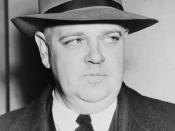During the 1950s, the American people began to develop a fear of internal communist subversion. The Korean stalemate, the "loss" in China, and the development of a Soviet atomic bomb were setbacks in the American battle against communism. Searching for people to blame, the American people were attracted to the idea of a communist conspiracy within American borders. Out of this "witch hunt," the Federal Employee Loyalty Program, the House Un-American Activities Committee, and the Hiss-Chambers case emerged to highlight such paranoia.
In 1947, the HUAC held publicized investigations to prove that the government, under Democratic rule, allowed communist subversion. The committee argued that communists had infiltrated Hollywood and it was tainted by communist propaganda. Actors and writers were investigated heavily. They were called to testify about their political beliefs. Ten ("the Hollywood Ten") refused to answer and were jailed for contempt. Many were "blacklisted" and were denied employment.
Thus, many careers ended tragically.
The public was greatly alarmed by communist subversion when charges of disloyalty were leveled against Alger Hiss, a high-ranking member of the State Department. In 1947, Whittaker Chambers, a former communist agent, claimed that Hiss passed classified State Department documents through him to the Soviet Union. Chambers brought forth microfilms of the documents that where hidden in a pumpkin in his garden. Although he was not tired for espionage, Hiss was convicted of perjury and was sentenced to several years in jail.
In 1947, the Truman administration initiated the Federal Employee Loyalty Program which reviewed the "loyalty" of federal employees. Truman also authorized sensitive agencies to fire people that were security risks. By 1951, 2,000 government officials resigned under pressure and 212 were fired. The director of the FBI, J. Edgar Hoover, investigated and harassed alleged radicals. The employee loyalty program became a signal...


